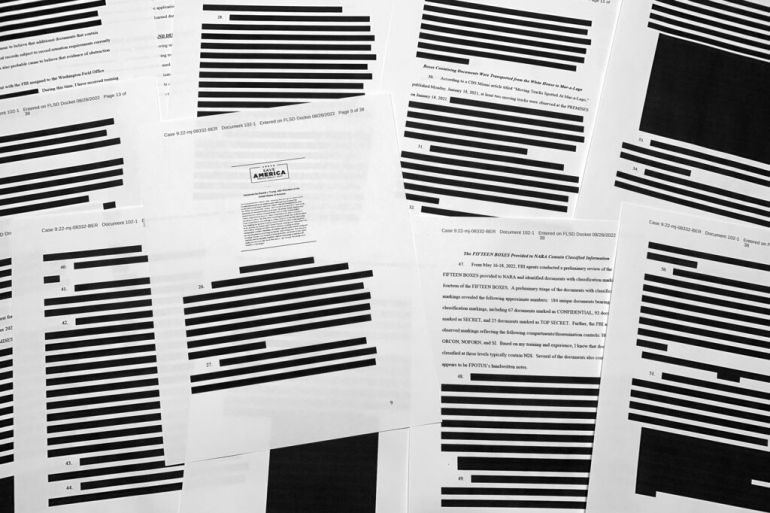What’s in the affidavit that led FBI to search Mar-a-Lago?
Justice Department document confirms criminal investigation into DonaldTrump’s alleged mishandling of classified information.

The affidavit that was behind the search warrant carried at Donald Trump’s home earlier this month has shed some light about the probe into the former president’s conduct, which has dominated headlines throughout August.
Although heavily redacted, the document released on Friday by a court order confirmed previous reports that the FBI and the Department of Justice are investigating Trump for the alleged mishandling of classified material and offered new details about the August 8 search.
Keep reading
list of 3 itemsBiden slams ‘semi-fascism’ in GOP as he rallies for Democrats
US Justice Department releases Trump search affidavit
Trump and his supporters have been accusing the authorities without evidence of targeting for political reasons, a charge that the former president renewed after the release of the affidavit on Friday.
Here here key takeaways from the document:
The US is conducting a ‘criminal investigation’ into Trump
The affidavit spells out what legal scholars had suspected after the FBI conducted an unprecedented search at the former president’s Mar-a-Lago home in Florida: The US government is carrying out a criminal probe into Trump.
“The government is conducting a criminal investigation concerning the improper removal and storage of classified information in unauthorized spaces, as well as the unlawful concealment or removal of government records,” the document reads.
A criminal investigation may result in charges against the former president, which could throw the US political order into chaos. Trump is considered a frontrunner for the 2024 Republican presidential nomination, but he has not officially announced his candidacy.
The affidavit also said there is “probable cause to believe that evidence of obstruction” would be found at Trump’s home, without offering details.
FBI searched for documents containing ‘National Defense Information’
According to the affidavit, the 15 boxes of documents returned to the US National Archives and Records Administration (NARA) by Trump’s office in January featured “classification markings, which appear to contain National Defense Information (NDI)”.
The US government believed that there were more such documents to be retrieved in the search, the FBI said.
A property receipt of items taken from Trump’s home by the FBI showed earlier this month that agents recovered documents labelled “top secret” from Mar-a-Lago, the highest level of classification.
Mishandling information relating to national defence is a crime under the Espionage Act, which aims to protect the US government from spying.
The FBI may have known where exactly to look for documents
An FBI agent, whose name was blocked in the document, appeared to provide precise locations of where classified documents may be found at Trump’s home.
The agent stresses that “the storage room”, Trump’s residential suite, a place called Pine Hall and the “45 Office” are not authorised spaces for keeping classified information, suggesting that the FBI suspected that such documents are stored there. Nowhere in Mar-a-Lago had been authorised for storage of classified documents since the end of the Trump presidency the agent said he believed.
“As described above, evidence of the SUBJECT OFFENSES has been stored in multiple locations at the PREMISES,” the agent writes, referring to Trump’s home.
It is not clear how the FBI obtained such information; preceding paragraphs to that section are almost entirely redacted.

Department of Justice fears for witnesses
In a legal brief accompanying the affidavit, the Department of Justice argued against making public the redacted parts of the document.
“If witnesses’ identities are exposed, they could be subjected to harms including retaliation, intimidation, or harassment, and even threats to their physical safety,” prosecutors wrote. “As the Court has already noted, ‘these concerns are not hypothetical in this case.'”
It added that FBI agents whose names appeared in previous documents relating to the investigation received threats of violence.
“Exposure of witnesses’ identities would likely erode their trust in the government’s investigation, and it would almost certainly chill other potential witnesses from coming forward in this investigation and others,” the document says.
The Department of Justice had opposed releasing the affidavit.
There is more to learn
While the 38-page document offers some specifics about the search and the suspected criminal conduct in which the Department of Justice said Trump engaged, it does not tell the entire story.
The document is substantially redacted with names and witness testimony is blocked.
And so, it would be difficult to speculate whether the investigation will lead to charges against Trump based on the affidavit.
Trump appeared unfazed by the document’s release on Friday, reiterating that the search at his home, which he lablled a “total public relations subterfuge” by the FBI and the Department of Justice, should have never been approved by the judge.